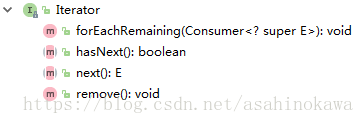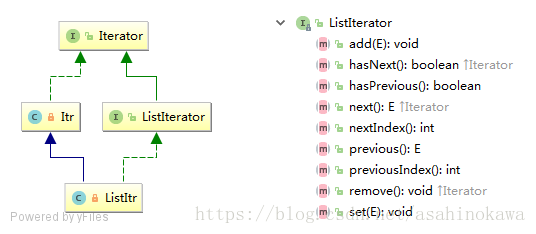Iterable 从前文的继承关系图来看,Collection继承自Iterable。其接口详情如下:For-each Loop .
1 2 3 4 5 6 7 8 9 10 11 12 13 14 15 16 17 18 public Iterator<E> iterator () { return new Itr (); } public void forEach (Consumer<? super E> action) { Objects.requireNonNull(action); final int expectedModCount = modCount; @SuppressWarnings("unchecked") final E[] elementData = (E[]) this .elementData; final int size = this .size; for (int i=0 ; modCount == expectedModCount && i < size; i++) { action.accept(elementData[i]); } if (modCount != expectedModCount) { throw new ConcurrentModificationException (); } }
对于其中的modCount,它记录的是这个list被结构性改变的次数。结构性修改是指那些改变了list的size的操作 。这段代码恰好解释了其的作用,如果遍历的过程中,修改了list导致size变化了,那么将会引起modCount的改变,所以此时会造成modCount != expectedModCount成立,即抛出异常。
Iterator 上文中的Itr便实现了Iterator这个接口,这个接口的详情如下:Itr的具体实现如下:
1 2 3 4 5 6 7 8 9 10 11 12 13 14 15 16 17 18 19 20 21 22 23 24 25 26 27 28 29 30 31 32 33 34 35 36 37 38 39 40 41 42 43 44 45 46 47 48 49 50 51 52 53 54 55 56 57 58 59 60 61 62 63 private class Itr implements Iterator <E> { int cursor; int lastRet = -1 ; int expectedModCount = modCount; public boolean hasNext () { return cursor != size; } @SuppressWarnings("unchecked") public E next () { checkForComodification(); int i = cursor; if (i >= size) throw new NoSuchElementException (); Object[] elementData = ArrayList.this .elementData; if (i >= elementData.length) throw new ConcurrentModificationException (); cursor = i + 1 ; return (E) elementData[lastRet = i]; } public void remove () { if (lastRet < 0 ) throw new IllegalStateException (); checkForComodification(); try { ArrayList.this .remove(lastRet); cursor = lastRet; lastRet = -1 ; expectedModCount = modCount; } catch (IndexOutOfBoundsException ex) { throw new ConcurrentModificationException (); } } @Override @SuppressWarnings("unchecked") public void forEachRemaining (Consumer<? super E> consumer) { Objects.requireNonNull(consumer); final int size = ArrayList.this .size; int i = cursor; if (i >= size) { return ; } final Object[] elementData = ArrayList.this .elementData; if (i >= elementData.length) { throw new ConcurrentModificationException (); } while (i != size && modCount == expectedModCount) { consumer.accept((E) elementData[i++]); } cursor = i; lastRet = i - 1 ; checkForComodification(); } final void checkForComodification () { if (modCount != expectedModCount) throw new ConcurrentModificationException (); } }
因此,使用Iterator遍历,是一个单向的遍历过程,且在过程中不能进行修改size的操作,否者会报错。一些错误的示例代码如下:
1 2 3 4 5 6 7 8 9 10 11 12 public static void main (String[] args) { ArrayList<String> list = new ArrayList <>(Arrays.asList("Hello" , "world" )); Iterator it = list.iterator(); it.next(); it.next(); it.next(); } ------ Exception in thread "main" java.util.NoSuchElementException at java.util.ArrayList$Itr.next(ArrayList.java:854 ) at Main.main(Main.java:10 )
1 2 3 4 5 6 7 8 9 10 11 12 public static void main (String[] args) { ArrayList<String> list = new ArrayList <>(Arrays.asList("Hello" , "world" )); Iterator it = list.iterator(); it.next(); list.add("too young" ); it.next(); } ------ Exception in thread "main" java.util.ConcurrentModificationException at java.util.ArrayList$Itr.checkForComodification(ArrayList.java:901 ) at java.util.ArrayList$Itr.next(ArrayList.java:851 ) at Main.main(Main.java:9 )
关于forEach()的使用Iterato时,可以使用其中的forEachRemaining(),效果类似,只是对象是后续剩下的元素。1 2 3 4 5 6 7 8 9 10 11 12 public static void main (String[] args) { ArrayList<String> list = new ArrayList <>(Arrays.asList("Hello" , "world" )); list.forEach(System.out::println); list.forEach(item->{ System.out.println("for each : " +item); }); } ------ Hello world for each : Hellofor each : world
ListIterator 简易的继承关系图、接口主要方法如下图所示:ListIterator,但是在看Itr时,看到了这个实现,还是挺想知道这是干什么的。ListIterator的方式如下:
1 2 3 4 5 6 7 8 public ListIterator<E> listIterator (int index) { if (index < 0 || index > size) throw new IndexOutOfBoundsException ("Index: " +index); return new ListItr (index); } public ListIterator<E> listIterator () { return new ListItr (0 ); }
其实现的源码如下:
1 2 3 4 5 6 7 8 9 10 11 12 13 14 15 16 17 18 19 20 21 22 23 24 25 26 27 28 29 30 31 32 33 34 35 36 37 38 39 40 41 42 43 44 45 46 47 48 49 50 51 52 53 54 private class ListItr extends Itr implements ListIterator <E> { ListItr(int index) { super (); cursor = index; } public boolean hasPrevious () { return cursor != 0 ; } public int nextIndex () { return cursor; } public int previousIndex () { return cursor - 1 ; } @SuppressWarnings("unchecked") public E previous () { checkForComodification(); int i = cursor - 1 ; if (i < 0 ) throw new NoSuchElementException (); Object[] elementData = ArrayList.this .elementData; if (i >= elementData.length) throw new ConcurrentModificationException (); cursor = i; return (E) elementData[lastRet = i]; } public void set (E e) { if (lastRet < 0 ) throw new IllegalStateException (); checkForComodification(); try { ArrayList.this .set(lastRet, e); } catch (IndexOutOfBoundsException ex) { throw new ConcurrentModificationException (); } } public void add (E e) { checkForComodification(); try { int i = cursor; ArrayList.this .add(i, e); cursor = i + 1 ; lastRet = -1 ; expectedModCount = modCount; } catch (IndexOutOfBoundsException ex) { throw new ConcurrentModificationException (); } } }







